CARE

Member Updates
By country
Member Update
More Updates
Member Update
CARE Afghanistan deployed three mobile health teams on June 22 to Khost and Paktika provinces, immediately following the devastating earthquake in eastern Afghanistan that is estimated to have killed between 770 and 1,000 people, left thousands more injured, and destroyed homes and livelihoods. Learn more
As Ukrainian refugees arrive and find themselves in a completely new place, they can find foreign health and legal systems and hard to navigate. In Poland, CARE has partnered with local organizations primarily specializing in helping women with their specific needs. Learn more
CARE and partner Charity Foundation for Stabilization Support Services (CFSSS) are working together to deliver live-saving assistance for people in need inside Ukraine. CARE and CFSSS are providing food and water as well as distributing hygiene items and medical packages for internally displaced people. Recently, CFSSS food distribution has taken place in Lviv, Chernivtsi, and Truskavets. Learn more
CARE is leading partners Jhpiego, Howard Delafield International, Association of Youth Organizations Nepal (AYON), and Nepal Contraceptive Retail Sales Company to implement the USAID Adolescent Reproductive Health (ARH) Activity. This partnership will enable meaningful youth engagement and private sector engagement. CARE is pleased to lead the ARH consortium and contribute to a healthy, resilient, well-nourished population in Nepal, leading to increased human capital. Learn more
CARE has provided funding to the Kabul Women's Association, which has gone towards paying rent and utilities on the KWA’s building. CARE has also offered training on advocacy, recording GBV cases, and mediating complex family situations. Monthly training opportunities on different subjects are offered to each of the KWA’s 20 action groups, with CARE paying rent for venues in different districts around the city. Learn more
Women make up around 80% of the workforce in the garment industry* but often struggle to have their voices heard. CARE spoke to inspiring leaders in Bangladesh, Vietnam, and Indonesia to learn what matters most to them, and documented their stories via women-led photography teams from each country. These women are leading changes within their factories and communities, a task that grew exponentially more difficult when COVID-19 brought about lockdowns, closed borders, and idled factories. Read their stories
